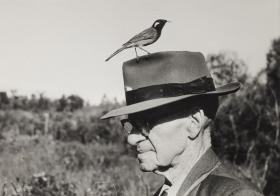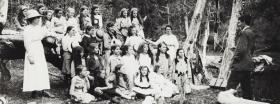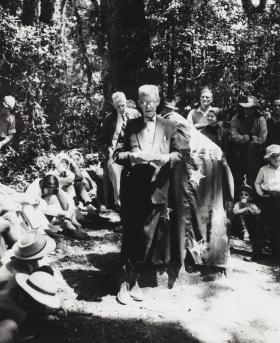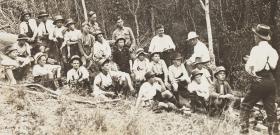Alec Chisholm (1890–1977) was once famous in Australia. Although that’s no longer so, he’s a man worth remembering. Journalist, historian, literary critic, naturalist, conservationist and encyclopaedia editor, he was among the last of a species of self-educated polymaths who were once prominent in Australian public life. I’m writing his biography, based on the Mitchell Library’s enormous collection of Chisholm’s papers, in the process gaining some fascinating insights not only into his character but also into the extraordinary transformations of Australia and the world over the eighty-seven years he lived.
In his own lifetime, Chisholm was best known for his writings on nature, especially birds, and it’s on those I shall focus here. His nature writings were breezy and exuberant, conveying an emotional response to the natural world while at the same time minutely documenting it. His enthusiasm seems to have been infectious since he had a large and eager readership among Australians from all walks of life. Sometimes bluntly, sometimes subtlety, Chisholm wove a conservation message through his nature writings. He also yoked an appreciation of Australian nature to the cause of Australian nationalism.
Chisholm advertised the nature–nation link in the title of his first book: Mateship with Birds (1922). In his many subsequent books on natural history, too, he sought to arouse in readers both affection for nature and attachment to their native land. Readers and critics were attuned to the message, one of his many correspondents praising Mateship with Birds because
‘it creates and nourishes in a most winsome way a young Australian’s love for Australia.’
Reviewing another of Chisholm’s books, Birds and Green Places, Donald Macdonald commended it for helping young readers ‘to become good Australians.’
Chisholm himself acknowledged – or rather, celebrated – the nationalist strand in his nature writings. In response to a request from Rex Ingamells, he wrote a piece for the 1948 Jindyworobak Review in which he explained that naturalists like himself were ‘comrades-in-arms’ with the Jindyworobak poets, each in his own way seeking to build up a nationhood anchored to ‘appreciation of one’s own country.’ Australians should also cultivate ‘an international outlook’, he warned, but the pressing need was ‘to build our country to mellow nationhood’ whereby Australians could appreciate other lands but be intimately bonded to their own.
Chisholm’s entire output of natural history writings can be seen as an attempt to foster intimacy with nature among the Australian public. Through such intimacy, the Australian people would come to value the plants, animals and landscapes of this country, seek to conserve them and make them intrinsic to their national identity. As the Australian environmental scientist George Seddon has observed, ‘intimacy, knowledge, love, the attributing of care are the foundation of all real conservation.’ Chisholm, a self-described ‘bush naturalist,’ understood this decades before Seddon said it.
Throughout his adult life, Chisholm was involved in nature-study programs in schools. He put the emphasis not on science teaching – though he acknowledged a place for that – but on field excursions that would inculcate in students a ‘smiling acquaintance with the good green earth’ and thereby make them ‘better patriots.’ The same message – that the ‘good patriot’ cherished the birds, animals and plants of his or her native land – pervaded Chisholm’s many other writings for children, such as his ‘Notes for Boys’ in the Melbourne Argus and his articles in the Gould League Notes.
Chisholm was an ornithologist but he deplored the cold rationalism of much scientific ornithology. He wanted people to be ‘mates’ with birds. Or, as he explained elsewhere, Australians must cultivate a ‘fraternal attitude towards birds ... if we as a nation are to develop any real measure of alliance with our native earth.’ For the same reason, he wanted to see the evolution of an ‘Australian folk-lore’, centred on nature and fostering both love of this land and reverence for its flora and fauna. Unlike his Jindyworobak ‘comrades’, however, he did not recommend appropriating Aboriginal folklore to this end.
To the dismay of his scientist friends, such as the zoologist Jock Marshall, Chisholm’s writings on birds are pervaded with anthropomorphism. He insisted that birds had aesthetic sensibilities; that bowerbirds decorated their bowers not just to attract a breeding partner but also to create something beautiful; that lyrebirds and other mimics were aware of their own artistry; and that birds sang to express their ‘joie de vivre.’ Such ‘unscientific’ notions may have been an outcome of Chisholm’s self-education, but the frequency and fulsomeness of his anthropomorphising seem to have been deliberately aimed at prompting his readers to emotionally connect with birds, and ultimately with nature more generally.
Chisholm’s life-long interest in vernacular bird names was also driven, to a large extent, by his notion that euphonious names fostered familiar relations. ‘We seem to like best those birds which have been given homely and pleasant titles,’ he claimed, for thereby ‘they become, as it were, members of our family, and we speak of them as we do of close friends.’ Moreover, having ‘easy, graceful vernaculars for our Australian birds’ would facilitate their inclusion in the national literature. We need ‘melodious names’ for our birds, Chisholm declared,
‘so that our poets may assist the birds to sing their way into the heart of the nation.’
Chisholm was not alone in bonding nature to nation. Many of his fellow nature writers made the same connection. But Chisholm holds special interest, not only because I’m writing his biography but also because he was among the most popular and widely-read Australian nature writers between the 1920s and the 1960s. Indeed, it would be fair to say that over those decades, Chisholm was one of the major figures who inspired Australians to see nature anew, as part of the national heritage. This, as several environmental historians have acknowledged, was a vital phase in the growth of a conservationist ethos in a settler society. Conservation of the kind Chisholm espoused may not always align with today’s Green politics, but it still resonates with today’s concerns.
Late in life, as he neared the age of eighty, Chisholm wrote of the emergence of:
'A new loyalty to the land, based on the interest and value of both fauna and flora, and so setting its combined face against, in particular, the destruction of birds by pesticides, the wholesale slaughter of marsupials by bullets, and the reckless devastation of scenic beauty.
If and when such an attitude develops - in defiance of the lure of dollars - Australia may indeed be described as the Lucky Country'.
Ever the optimist, Chisholm strove always to put a positive slant on things. Yet as the foregoing quotation illustrates, he was realist enough to recognise that whatever advances had been made toward a conservationist consciousness, there was still a long way to go. And so, he would acknowledge, it remains today.
Author
Russell McGregor is an Adjunct Professor of History at James Cook University and the author of several prize-winning books. He is currently writing a biography of the popular natural history writer and pioneer conservationist, Alec Chisholm, for which he was awarded the 2016 David Scott Mitchell Fellowship at the State Library of NSW.




